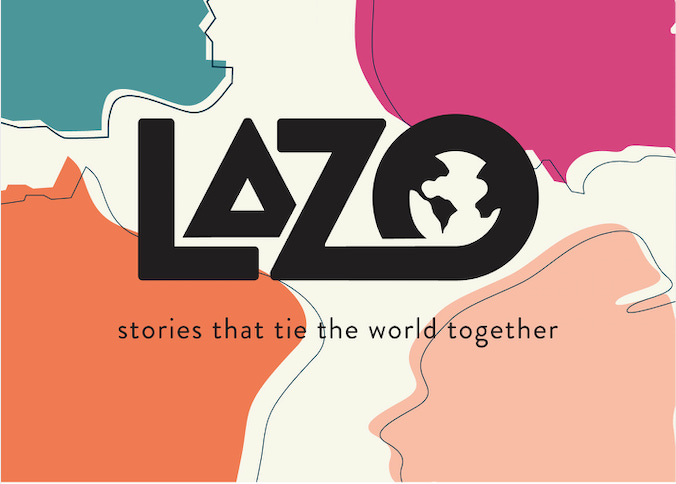Hello, friends! Cristina Maza here. I am so pleased to announce that Lazo Magazine is officially online in its semi-final form. You can check out the new website here.
To all of the new people, welcome! Lazo Letters is a weekly dispatch that distills news from around the globe and includes my reporting from Washington, D.C., and the U.S. Congress, where I cover all things foreign policy. It’s also the official newsletter of my new project, Lazo Magazine. We’re building an international community of people who follow world news, are engaged with what’s happening around the globe, and want more information about people and places that don’t get much media attention. This project is for people who travel often and who read a lot. It’s for those with multiple identities and many places they call home. In other words, people like you and me.
Now that we’re online, I’ve put out a call for pitches. If you or anyone you know is a writer or reporter and wants to contribute, please tell them to send their ideas to lazomag@proton.me. Our first batch of stories will be about pluralism. I’m especially looking for examples of pluralism that work well. Here’s a bit more info:
My goal for the next few weeks is to live joyfully. I’ll be celebrating a dear friend’s wedding this weekend in my adopted home city (some of you might be there). Then, I’m leaving for a 10-day trip to an undisclosed location to have a reunion with old friends.
I fly back to the U.S. at the end of November, and I look forward to curling up on a dark evening to read pitches the first weekend I’m back.
This newsletter will be on hiatus until Sunday, Dec. 1, so I have time to parse through story ideas.
If you want to support Lazo Magazine, now is the perfect time to do it. Every single penny, pence, euro, or whatever currency you use will go to paying the writers and editors who will craft Lazo Magazine into the unique corner of the Internet it aspires to be. Thank you all so much for being here. I am eternally grateful for your time and attention. And if there’s anything you want to see in this space, you can always write to me directly: c.maza@protonmail.com.
What I’m writing:
• With the House and the Senate at loggerheads over how to avoid a government shutdown, craft appropriations bills, and pass a national security supplemental over the next several months, U.S. assistance for Ukraine has almost entirely run out. The Pentagon told me they are providing Ukraine with smaller military aid packages “in order to stretch out our ability to support Ukraine for as long as possible.” This story is unlocked and free to read.
My weekly news blurbs:
What I’m reading:

• New Lines Magazine has an article about Afghan Jews thriving in Queens, New York.
• More than 10,000 people, including 4,000 children, have been killed in Gaza since the war broke out, the BBC reports.
• U.S. Secretary of State Antony Blinken spoke to Israeli Prime Minister Benjamin Netanyahu about “concrete steps” Israel should take to reduce civilian deaths, the New York Times reports. The steps included gathering more intelligence on Hamas, using smaller bombs to collapse the tunnel network, and deploying ground forces to separate the civilians from militant locations.
• Israeli Prime Minister Benjamin Netanyahu rejected calls for a ceasefire and said that Israel would have indefinite “overall security responsibility” in Gaza after its war with Hamas, the Associated Press reports.
• Israel agreed to daily four-hour “tactical, localized pauses” of military operations in parts of northern Gaza to allow the distribution of humanitarian assistance and civilian evacuations, the Washington Post reports.
• U.S. Secretary of State Antony Blinken said that Gaza should be unified with the West Bank under the Palestinian Authority once the war ends, the New York Times reports.
• Israeli Prime Minister Benjamin Netanyahu said his country does not “seek to conquer,” “occupy,” or “govern Gaza” after its war with Hamas, Reuters reports.
• Israel attempted to gain international support for the transfer of several hundred thousand civilians from Gaza to Egypt, the New York Times reports. The idea was dismissed by most countries, including the U.S. and the UK, because of the risk of permanent displacement.
• Experts say humanitarian pauses won’t do much to ease the suffering in Gaza, Al Jazeera reports.
• Approximately 520 aid trucks entered Gaza in the past month, according to the U.S. State Department — roughly the same number the United Nations sent every day before the war, the New York Times reports.
• Doctors in Gaza have been performing operations, including amputations, without anesthesia, CNN reports.
• Israeli fighter jets struck 450 Hamas targets in Gaza and seized a militant compound, Reuters reports, citing the Israel Defence Forces. A senior Hamas Commander, Jamal Mussa, was allegedly among those killed.
• The United Nations reports unprecedented levels of Palestinian displacement, with over 1,100 Palestinians in the occupied West Bank having been displaced since 2022 primarily due to a rise in Israeli settler violence, the Associated Press reports.
• Doctors Without Borders expressed concerns over the “dramatic increase in violence from Israeli forces” in the Jenin refugee camp in the West Bank, including “widespread bombing and shooting.”
• Israel’s spy agency worked with Brazil and other international agencies to thwart an attack aimed at Israeli and Jewish targets in Brazil planned by the Iranian-backed Lebanese Hezbollah, Reuters reports.
• Chile is home to the largest Palestinian population outside of the Middle East, making the community a political force, Al Jazeera reports.
• The Biden administration was warned by U.S. diplomats in the Middle East that its support for Israel is being viewed as “material and moral culpability” in “possible war crimes,” resulting in the loss of “Arab publics for a generation,” according to an embassy cable obtained by CNN.
• Ukraine urged world leaders to continue their support following comments from Italy’s Prime Minister Georgia Meloni, who said there is “a lot of fatigue…from all sides” during a call with Russian pranksters, Politico Europe reports.
• U.S. and European officials have begun quietly talking to the Ukrainian government about what possible peace negotiations with Russia might entail to end the war, NBC News reports.
• Ukraine is ready to begin the process of joining the European Union, according to the European Commission President Ursula von der Leyen, CNN reports.
• The European Commission’s recommendation that member states open EU membership talks with Ukraine is seen as critical to Kyiv’s accession gaining support from the bloc’s 27 members. But the commission has placed caveats on when the talks should begin, the Financial Times reports.
• More than 20,000 trucks from Poland and Ukraine are blocked at three major border crossings as striking Polish drivers protest an EU deal that allows Ukrainian trucks unlimited access to the bloc, CNN reports.
• Romania is at a dangerous tipping point, Maximilian Hess writes for Foreign Policy. The country is increasingly important to the world—and increasingly unstable.
• The European Union gave Bulgaria an exemption to protect its citizens from oil shortages. But Sofia took advantage of loopholes to refine the oil and export it abroad — helping Russia make around €1 billion, according to an investigation by the NGO Global Witness and others.
• Italian Prime Minister Giorgia Meloni struck a deal to build two migrant reception centers in Albania, Politico Europe reports. The structures, due to open in spring 2024, will aim to house 36,000 migrants a year when fully operational.
• Spain’s Socialist Party struck a highly controversial deal to remain in power by offering an amnesty to separatists who staged a failed 2017 bid for Catalan independence in exchange for their political backing, the Washington Post reports. The details of the amnesty law must be approved by parliament.
• A letter from the European Commission expressing concerns about Spain’s rule of law developments and requesting information on the controversial Catalan amnesty law sparked a tense response from the Spanish government, Euractiv reports.
• Portuguese Prime Minister António Costa submitted his resignation after police raided his official residence, and the country’s attorney general confirmed he was being investigated under a corruption probe, Politico Europe reports. Portuguese President Marcelo Rebelo de Sousa announced he would dissolve the country’s parliament in December and hold an early election in March 2024.
• The independent Kloop website's Kyrgyz-language pages were blocked in Kyrgyzstan amid ongoing pressure on the owner, Radio Free Europe reports.
• India and Canada are once again facing diplomatic tensions after a prominent Canada-based Sikh separatist leader, Gurpatwant Singh Pannun, warned Sikhs not to travel on Air India flights, citing potentially life-threatening consequences, the Independent reports.
• In Guinea, former military ruler Moussa Dadis Camara and three other officials escaped out of Conakry’s Central House prison, prompting a nationwide manhunt, Reuters reports. Camara and others were on trial since last year, accused of mass rape and orchestrating a stadium massacre in which 150 people were killed during a pro-democracy rally in 2009. Camara was reportedly returned to the prison by the end of the day.
• Fighting between the Ethiopian army and a local militia in the northern Amhara region raises safety concerns for historic churches in the holy town of Lalibela, Reuters reports.
• Refugees in Darfur, Sudan, report a surge in ethnically-driven killings as the paramilitary Rapid Support Forces took over the main army base in Darfur’s capital, Reuters reports.
Interesting statements:
You can write to me for any reason: c.maza@protonmail.com.










